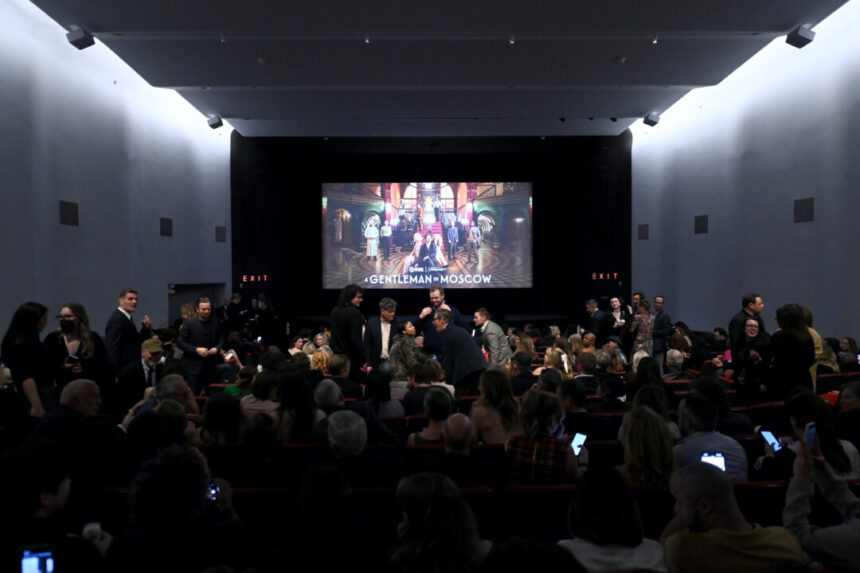Commentary
Finding a compelling streaming series can be a challenge, as many tend to start slow and require multiple episodes to capture your interest. However, the payoff of discovering a great series is worth it, with each new episode becoming eagerly anticipated. (For me, the two seasons of “White Lotus” fall into this category.)
After watching the first episode of “A Gentleman in Moscow,” I initially thought I had discovered a promising series. Based on the 2016 novel, this new show for Showtime and Paramount+ stars Ewan McGregor as a count from the tsar era navigating the aftermath of the Russian Revolution.
The premiere episode set up an intriguing story, with the count facing house arrest in a hotel while the Bolsheviks debated his fate and the future of Russia. However, the introduction of black actors in prominent roles in subsequent episodes left me puzzled and questioning the artistic choice behind this casting decision.
Research revealed that there was no significant black population in Moscow during that time period, and the original book did not feature black characters. This raised the question of whether the casting of black actors to play white Muscovites was intentional or simply a lack of historical accuracy.
Comparisons were drawn to the deliberate casting choices in the Broadway musical “Hamilton,” where minority actors were cast in key roles to tell America’s founding story from a contemporary perspective. However, the rationale behind the casting in “Gentleman” remains unclear, leading to confusion and speculation among viewers.
The unexpected casting choices in “Gentleman” have sparked debate among audiences, with some questioning the authenticity and impact of diverse casting in a period drama. While the series has received critical acclaim, audience reviews highlight concerns about the portrayal of historical accuracy and the integration of DEI principles in casting decisions.
It appears that the industry trend towards inclusive representation and challenging traditional casting norms may have influenced the casting choices in “Gentleman,” aligning with broader efforts to diversify on-screen talent. However, the lack of clarity from producers on their casting decisions leaves room for interpretation and criticism.
Ultimately, the use of black actors to play white characters in “Gentleman” raises questions about the boundaries of diversity and inclusion in storytelling, and whether such decisions prioritize representation over historical accuracy. As the entertainment industry continues to evolve, the impact of casting choices on storytelling and audience reception remains a topic of ongoing discussion.
“Inclusion” means having a diverse representation of minority, female, and LGBT individuals, rather than simply mirroring society by decreasing the number of white, male, and straight individuals.
We have come to understand that “equity” differs from “equality.” While equality involves treating everyone the same, equity involves treating individuals differently based on their minority status. For example, the left would not accept white actors taking roles from black actors in historical films about black individuals.
The implementation plan for Diversity, Equity, and Inclusion (DEI) on screen was solidified with the introduction of the Academy of Motion Picture Arts and Sciences’ new “representation and inclusion standards” for Oscars eligibility. These standards aim to promote fair representation both on and off screen to better reflect the diversity of the audience.
There are four categories of diversity requirements, with at least two needing to be met. The first category mandates that either “at least one of the lead actors or significant supporting actors is from an underrepresented racial or ethnic group,” “at least 30 percent of all actors in secondary and minor roles are from underrepresented groups,” or “the main storyline, theme, or narrative of the film focuses on an underrepresented group.” Failure to meet these standards may result in lack of recognition for creative works.
In the iconic opening scene of “Schindler’s List,” Germans force Jews to register, line up, and wear identifying arm patches. The film portrays the devastating events that followed. Despite its critical acclaim, Hollywood demonstrated the dangers of discriminating against individuals based on ethnicity, a practice now emphasized by DEI initiatives. While it remains uncertain if Hollywood will create similar impactful films in the future, there is still room for growth and learning.
Opinions expressed in this article are solely those of the author and may not necessarily reflect the views of The Epoch Times.






